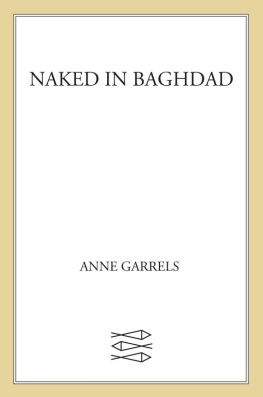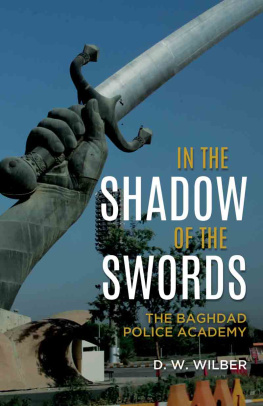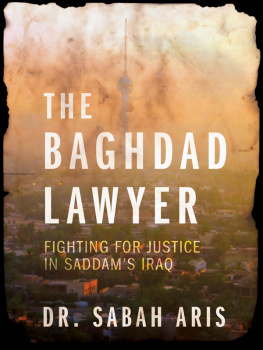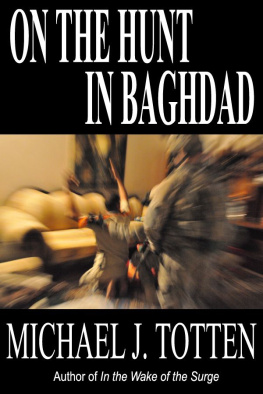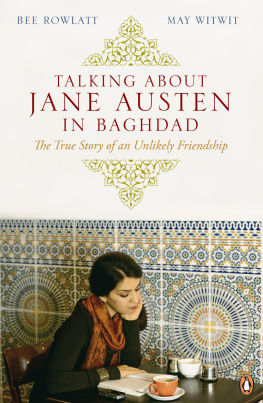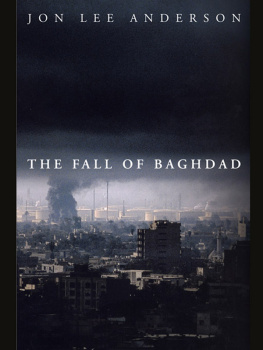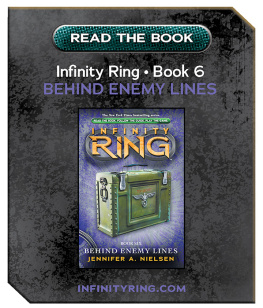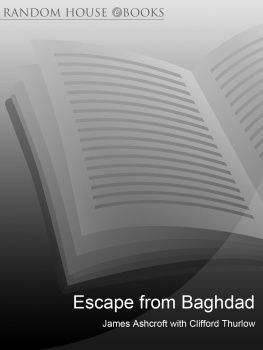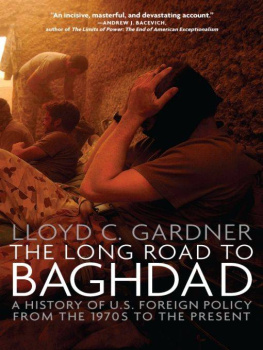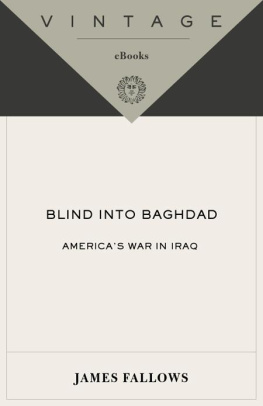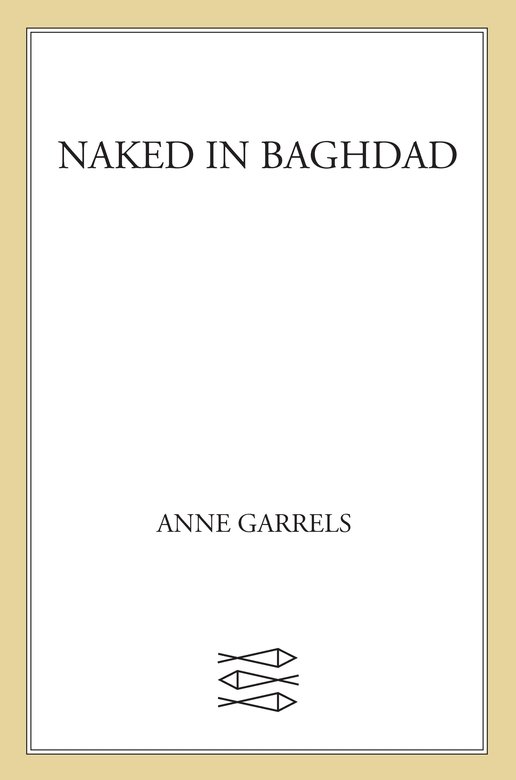
The trip to Baghdad started almost thirty years ago when I became a correspondent for ABC News. That rash and fateful assignment was made by Av Westin, who dared to believe I could do it. At National Public Radio there were people who once again dared to let me follow my instincts: Kevin Klose, Bruce Drake, Barbara Rehm, Loren Jenkins, and Doug Roberts. I cant begin to say how much I relied on their support and their verbal hugs, which even the sat phone could not distort. My thanks to everyone at NPR, a place where I dearly love to work, as well as to the listeners whose letters of concern, encouragement, and healthy criticism made me realize more than ever that this is a remarkable radio family.
Over the years I have been gone from home more than most families should or would tolerate, but I have an incomparable husband, two glorious stepdaughters, Gabrielle and Rebecca, and an absurdly large extended family who have put up with it all with stubborn love and infinite patience. Teeny and Warren Zimmermann and Pie and Alfred Friendly, who were responsible for this marriage, and hence for my sanity, picked up the slack when I disappeared, and they welcomed me when I returned. The Wednesday Group, John Funt, Kenneth Maxwell, and Christopher and Betsy Little, provided sustenance in more ways than one. And Vints harem, Chris Stansell, Dorothy Wickenden, Elizabeth Becker, and Ann Cooper, called regularly tocheck in on him and the dogs, making sure I had a husband to come back to.
Editors do make a difference. Jonathan Galassi immediately saw what this book could be, and with but the gentlest of prodding, the most incisive of comments, and Sunday-morning conferences, got this non-book-writer to do the impossible and finish on time.
Thanks to friends, family, and colleagues in many countries, but a special toast to those who were with me in Baghdad.
This is a chronicle of what I saw and heard during my visits to Baghdad, starting with my first assignment in October 2002 before the war, until I left after U.S. troops finally entered the Iraqi capital in April 2003. Some of it is drawn from my reports for National Public Radio; other parts derive from notes and reflections scribbled at the end of long days. It is a personal account of the buildup and conduct of the war, with a foreshadowing of the aftermath that will be with us for a long time to come. Each reporter covering Iraq, whether embedded or non-embedded, had but one window on the conflict and conflicting views. My non-embedded window was from Baghdad.
The book is enriched by e-mails that my husband, Vint Lawrence, sent to family and friends while I was gone. When I was lucky enough to read them I laughed, cried, and loved him all the more for how much he has loved me. As a friend has said, I reported the war and he reported on me, at times with honesty, at times with unbridled affection. Everyone should have such a Boswell.
This is also the story of an extraordinary Iraqi, without whose help I would have been deaf and blind to much that was going on around me. In the presence of minders, he had the presence of mind to negotiate our way through any manner of obstacles and dangers. Given the continuing uncertainty in Iraq, he has chosen to go by the pseudonym Amer. I owe him this, and a lot more.
As a radio correspondent, I was not very particular about the spelling of names, which are now to appear in print, so often they are only phonetically, not strictly orthographically, accurate.
May 2003
Norfolk, Connecticut
Well hello again,
Just when we were all getting used to the idea that our Annie was going to be more or less gainfully employed organizing the linen closet or darning socks by the fire, the damsel is off againthis time to Iraq. You might be forgiven for thinking that after Afghanistan, Pakistan, and Israel in the last year, NPR could come up with, say, an in-depth series on beach erosion between Bordeaux and Biarritz, but the straws in this outfit all appear to be short.
Remember that intrepid comic book character of our youth, Brenda Starr, who was always getting into and out of impossible scrapes? Well, someone the other day dubbed Annie Brenda of the Berkshires, a reference to our remote abode up here in the hills of northwest Connecticut. It fits, and it has a certain ring, so I have appropriated it. For those of you who have tolerated my scribblings since 9/11 when she headed off to Tajikistan and points south, these letters will no longer be just Annie Updates but Brenda Bulletins
Brenda, in her packing mode, is curious to observe. Well over a week before she actually leaves, many too many suitcases are dragged out, only to lie opened but untouched for days on the bed in the spare bedroom. Something Zen-like goes on as she circles and stares at the empty cases. Then one morning, in a flurry, there suddenly appears a great pile of brightly colored, neatly folded frocks and form-fitting pants and snappy shirts and fitted jacketsgorgeous oranges, lime greens, bright blues, and pinks predominate.These are the things Brenda would LIKE to take, the things that are in her nature. But inevitably these treasures go back in the closet, replaced by long, loose, formless things that cover everything and button all the way downthe cheerful pile morphs to monotonous blues and blacks. And by the end there are not very many of these, either, because so much technical gear has yet to go in. The old stand-by Sony cassette tape recorder that has been her mainstay all over the world with three dozen cassettes, the new still-unproven mini-recorder thats no bigger than a cigarette box, the satellite phone, the laptop, and an odd assortment of technical gear that makes her pieces sound as if they originated in a nearby mall, not halfway around the world. Stuffed in at the end is a huge wad of unread research, the unfinished expense-accounting from her last trip, a staggering number of pairs of reading glasses, and her one surviving hearing aid, a new one, made by an old Russian friend who is now an audiologist in Jerusalem. This tiny device has fifteen minuscule computers in it instead of four, enabling her to eavesdrop virtually on thoughts. That is, if she remembers to wear it.
Last-minute exotically wrapped cartons of new sophisticated equipment from NPR arrive. Miniature satellite-phone antennae blossom briefly amid the dahlias. An hour before the taxi is due, she is still downloading a complicated NPR program with a cool competence that may keep her safe until she returns.
She left here with a weighty array of journalistic weaponry that is lean, mean, and all business. All but the technical gear was checked-in luggage at JFK, where security pawed through everything; what was neatly packed upon leaving certainly will not be upon arrival. In the end she didnt even carry a change of clothes onto the plane; Brenda, as she will modestly admit, knowsif she knows nothing elsehow to SHOP.
So, our Brenda arrived safely in Baghdad from Jordan on Sunday. She spent the three days in Amman waiting for the promised Iraqi visa that never came. It was a quick lesson in how things workover there. She was finally able to reach Ahmed, the Iraqi fixer in Baghdad with whom she has been talking for weeks and who had promised to have the visa waiting for her. Ahmednow follow me on thissaid to her, No problem, all you have to do is contact Nabil in Amman. Well, Nabil wasnt much help but he turned her over to Amjad, who is a fellow big-time fixer in Amman. Amjad told her that he couldnt really help but that Ibrahim could. Ibrahim, in turn, passed her on to Mohammed, who said that for $200 he could set up a breakfast with the Iraqi ambassador. Well, that is how Brenda got her visa. Cheap at the price, it seems, as another news organization had bought the Iraqi ambassador his new car. In the fraying atmosphere of Amman, with everyone squirreling dollars, just about anything is for sale. She also found time in all this to do a yet-to-be-aired piece on how the Jordanians find themselves once again between Iraq and a hard place.


